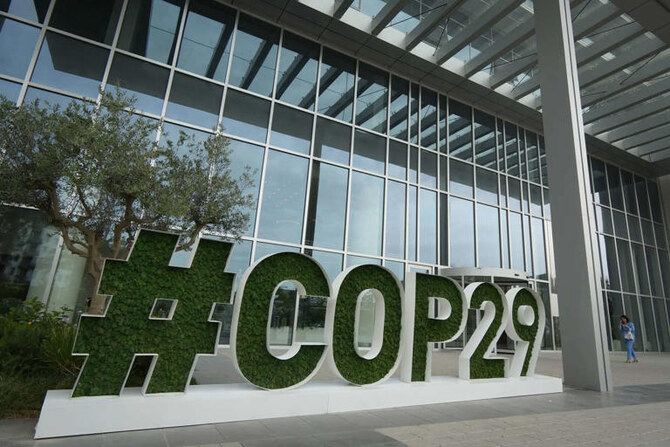RIYADH: Multilateral development banks are aiming to mobilize $120 billion annually by 2030 for climate financing in low- and middle-income countries, according to recent projections.
This ambitious funding goal includes $42 billion dedicated to climate adaptation efforts, with an additional $65 billion expected to come from private sector investments.
The target was unveiled in a joint statement issued during COP29 in Baku, Azerbaijan, by several prominent MDBs, including the Islamic Development Bank, African Development Bank, the Asian Development Bank, the Asian Infrastructure Investment Bank, the Development Bank of the Council of Europe, the European Bank for Reconstruction and Development, and the European Investment Bank. Additionally, the Inter-American Development Bank, the New Development Bank, and the World Bank Group are part of the initiative.
The statement emphasized that setting a strong, collective climate finance target is crucial to meeting the goals of the Paris Agreement.
“A new collective quantitative target on climate finance that is both strong and ambitious is essential to achieving the Paris Agreement’s objectives,” the statement read. “We urge parties to reach a robust conclusion on this target.”
For high-income countries, the MDBs have set a target of $50 billion in annual climate finance, including $7 billion specifically for adaptation, with private sector mobilization expected to generate an additional $65 billion. This new target builds on the success of previous climate finance goals, with MDBs already surpassing their climate financing projections for 2025. Since 2019, the MDBs have increased direct climate finance by 25 percent and doubled climate mobilization efforts over the past year.
In response to the urgent need for enhanced climate action, the MDBs also emphasized the importance of establishing a new collective quantitative target for climate finance at COP29. The institutions highlighted their commitment to ensuring that the finance provided leads to meaningful, measurable impacts on both climate mitigation and adaptation.
To further enhance the effectiveness of climate finance, the MDBs released the “Common Approach to Measuring Climate Outcomes,” a framework that provides standardized indicators for tracking global progress on climate mitigation and adaptation. This framework aims to better align MDB activities with global climate goals and improve transparency in measuring outcomes.
Additionally, the MDBs published their “Country Climate Action Platforms,” reaffirming their commitment to strengthening collaboration between host countries, MDBs, donors, and the private sector. These platforms are designed to ensure that climate finance is targeted effectively and that developing countries have the support they need to implement robust climate policies.
COP29 has emerged as a critical moment in global climate negotiations, especially for the Global South, where developing nations are pushing for significant climate financing, stronger adaptation measures, and equitable policy outcomes. These countries continue to advocate for a climate finance framework based on the principle of common but differentiated responsibilities, recognizing that nations’ contributions should reflect their respective capabilities and historical responsibilities.




























